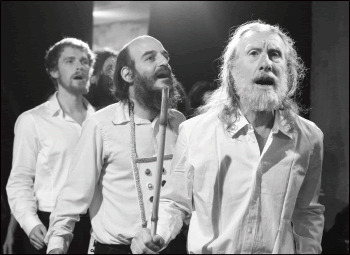BY JERRY TALLMER
Judith Malina: Horrifying with her politics since age 11
Let us do a little triangulation.
Here, at one point, is 21 Clinton Street on the Lower East Side of Manhattan in New York City.
This is where The Living Theatre, founded by Judith Malina and Julian Beck in 1947, lives and breathes these days, 64 years later, as does Judith herself, with a new play by her called “Korach” — a quasi-biblical hymn to anarchy (though Julian is long gone, as is, more recently, second husband Hanon Reznikov, who left behind him an early draft of the present work).
Far, far away, at the apex of an immensely long thin triangle, is Mount Sinai — not the New York City medical center, but the desert heights from which Moses, the lone, imperious, infuriated climber, brought back down the Ten Commandments only to smash them in the face of rebellious, anarchic challenges to his authority.
And here is the third peg of that extremely extended triangle, is a restaurant called Viand Cafe (at Broadway and 75th Street on the Upper West Side of Manhattan) where Judith Malina has come uptown to talk about “Korach” and theater and girlhood and anarchy — and her father, Max Malina (the rabbi who got himself and his family out of Germany and to New York just in time when Judith was three).
“When I was 12 years old,” Malina is saying, “I saw a movie called ‘Nurse Edith Cavell’ “ — released 1939, so Malina must really have been 13 years old — “in which a beautiful English actress named Anna Neagle, just before she’s shot as a spy by a German firing squad in World War I, says: ‘Standing as I am between God and eternity, I realize that patriotism is not enough.’
“That’s when I realized we must have no hatred or bitterness against anyone. I saw this movie,” says Judith,” at the Beacon Theater.”
What??? an interviewer all but shouts. Judith, the Beacon Theater is right over there, two doors away from where we’re sitting. It’s a rock palace nowadays.
“I know, “she says calmly. “So I ran home from the Beacon Theater — we used to live around here; we lived everywhere — and said to my father, the German-Jewish rabbi who was trying to rouse opinion against Hitler: ‘Papa, I’ve just seen this movie! We must not hate the Nazis!’ “
And what did your Papa say?
‘”He was horrified by my politics since I was 11.”
Max Malina, were he alive today, would be doubly horrified by “Korach,” in which the pace is set by Comrade Emma Goldman (all 4 foot 11 inches of actress Judith Malina, on film) preaching anarchy — the real pure stuff — first, last, and always.
EMMA: We are now in the midst of a profound social upheaval. We Anarchists can take heart that the young generation has lost its faith in government — not in any specific regime or government — but in the very notion of government itself. The time is ripe for us to organize the Anarchist Movement. If all the young people that are drawing the ‘A’ in a circle on the wall…really understood what that ‘Circle A’ means, we could really have a splendid revolution now — and in the deepest sense they do understand that the ‘Circle A’ means the yearning to be free of the unnecessary restrictions that our social system demands — and of the abuses of punitive law….
We will rally that energy, but we must beware of the ruthlessness of the great opposing camp. They are afraid of freedom because they believe that freedom will lead to chaos. We must show them the sense of consensus and collective decision-making that Anarchism offers. We must reassure the people that Anarchism doesn’t mean disorder, but a higher form of human organization. Comrade Alexander Berkman said, “Anarchism is organization; organization, and nothing but organization.”
If the people are not convinced of this — if they are afraid that anarchism means chaos and violence — they will wipe us out. They will eliminate us without mercy — as they have done in the Ukraine, in Spain, wherever the burgeoning Anarchist Movement threatened the maintenance of the state. Wherever Anarchism has been tried, it has succeeded in exemplifying a harmonious society. But it has frightened the people in power, and the Anarchists have always been wiped out — all the way back to Korach, in Biblical History.
We will lose every battle — except the last one.
This, from the woman who in May of 1963 (with her husband/co-artist/co-anarchist Julian Beck, along with actors and audience) burst in over the roof of their padlocked 14th Street theater to foil the feds and stage one last performance of Kenneth Brown’s “The Brig” — a Malina-directed portrait of hell as a U.S. Marine Corps disciplinary center.
This, also, from the woman who even earlier (1959) had brought forth at that temple the artistically even more revolutionary “The Connection” — a “jazz play” by young Jack Gelber about a roomful of druggies sitting around waiting for their fix to arrive. Or who placed before New York eyes and ears the rarely hazarded works of Bertolt Brecht and William Carlos Williams.
“I have always considered my theater,” says the Judith of here and now, “to be an adjunct of my father’s German-Jewish synagogue. Wherever we lived, East Side, West Side, my father’s study is where he conducted services, did bar mitzvahs, did circumcisions. On Saturdays you didn’t ride in a vehicle, didn’t turn on a light.
“In those days I considered myself a heretical Jew. I had to make a decision: Am I going to be an actress or am I going to be observant?”
One of the places where the Malina lived for several years was the old Broadway Central Hotel — the one that later fell down and killed a few people. “Six seventy-three Broadway,” says Judith, “between Bleecker and Third.”
Brad Burgess, the young assistant director of “Korach,” who has come uptown with her to sit in on the interview, shoots Judith a look.
“I can’t believe you remember that,” Burgess says, “when you can’t remember your current address.”
Judith Malina was born June 4, 1926, in Kiel, Germany. Three years later she arrived in America.
Brad Burgess was born March 1, 1985, in Boston, Massachusetts. He grew up in Lowell, went to Catholic schools, and is a nice kid sporting a 1960s Abbie Hoffman head of hair. His roots are French, Irish, Austrian. These (and nights), he is overseeing 25 anarchy-minded actors — some of whom, the Korachites, pop up on stage from 10,000 years punishment under the earth.
The Broadway Central Hotel — to be exact, the third floor of the Broadway Central Hotel — was where 11-year-old Judith Malina and her girlfriends first started putting on plays.
Judith, says her interviewer, it’s all well and good to preach and practice anarchy — but surely you didn’t create that company and put on all those extraordinary shows and hold everything together all those years and are still doing it without some measure of discipline. Maybe good strong discipline.
“Discipline, yes,” says Malina, “but not punitive law. Punitive law, no.”



































